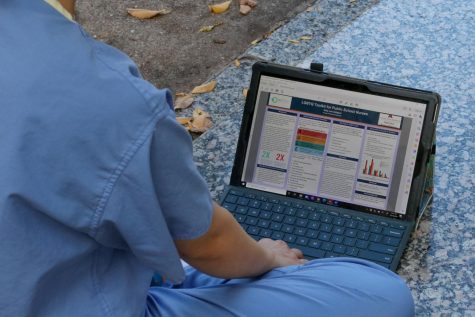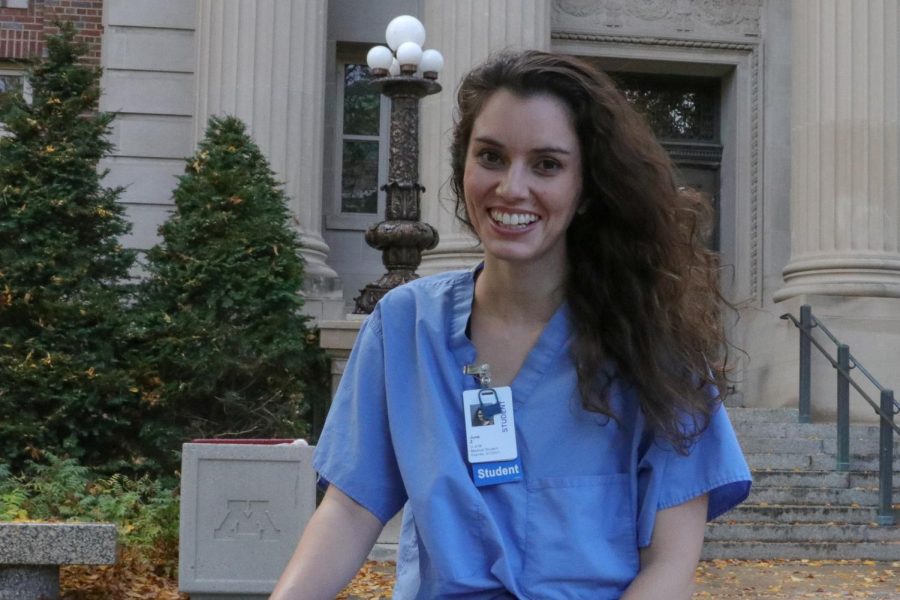Motivated by a need she saw for LGBTQ-specific health and education in the medical field, fourth-year University of Minnesota medical student Emily June Zolfaghari has been developing a resource guide for middle and high school nurses in the state to help provide more equitable care. Zolfaghari recently received the Minnesota Medical Association’s Student Leadership Award for her idea.
During her undergraduate years, Zolfaghari said some of her LGBTQ friends would talk to her about their frustrations with their healthcare providers who would often not ask the right questions, ignored their concerns related to sexuality and identity and would not make proper referrals, which resulted in them bouncing around looking for proper care.
While the University is a leader in the nation for LGBTQ studies, specialized care for LGBTQ people is not integrated into the core curricula of the Medical School, or in many schools nationally, said Zolfaghari.
Zolfaghari’s toolkit will take the form of an educational pamphlet of frequently asked questions, definitions about terms and tips related to gender and sexuality. It will provide guidance about pronoun usage and lists the contact information for organizations nurses can refer students to.
When doing her research, Zolfaghari said she found gaps in knowledge among school nurses surrounding topics like chest binding for more masculine-presenting students and red flags for suicidal ideation or eating disorders.
“If they have a health issue, a lot of times students’ first point of contact … isn’t just their [primary care physician] doctor, it’s the health nurse at school,” she said. “That’s where I came up with this idea of developing a toolkit, for these public school nurses to have so that they might be able to answer different questions for students that approach them.”
In 2018, Zolfaghari initially started the project as part of her year-long public health fellowship with the Twin Cities Medical Society. She said her hope is to collaborate with local social services organization OutFront Minnesota and distribute the guide to public school nurses around the state to use at their own discretion. She said she plans to complete the toolkit by May.
It is especially important for primary care physicians to build trust and relationships with their patients over time, according to Zolfaghari, because it will allow them to better understand medical problems and address them properly. If a patient lacks trust in their doctor, they are less likely to seek care, which can be detrimental to their health and long-term wellbeing, she said.
“A really big problem is if someone doesn’t feel like they trust the medical community, then they’re not going to go out and seek help when they need it,” Zolfaghari said.

Andrew Kuehne, a 2017 University alum who attended a more conservative high school in St. Cloud, said Zolfaghari’s toolkit would have been beneficial to him growing up.
“Having a non-biased resource, especially for families who aren’t as accepting, would be extremely helpful for establishing a good baseline of mental health for LGBTQ individuals, as well as giving a space where they can meet people who are equipped to talk with issues of identity and struggle that plague every high schooler, but especially plague plenty of LGBTQ youth,” he said.
Although he said he believes people are generally more open about gender and sexuality now, having a resource like this in many people’s formative years when they are coming to terms with their sexuality could foster healthier conversations about self-identity and emotion.
“Those formative years where you’re coming into your sexuality, you’re confused, you’re listening to the responses of people around you,” he said. “I think having a targeted resource where these kids could go to really would help at least waive some of the worries that many kids and kids like [me] struggled with as you’re going through some of the most fragile years of your life.”
Many LGBTQ people experience higher rates of bullying, depression, suicidality and sexually transmitted infections, said B.R. Simon Rosser, a professor at the University School of Public Health who researches LGBTQ sexual health and wellness. They also have an accelerated risk of social isolation and social stigma, which in turn can result in homelessness and family rejection. Marginalization is also compounded for LGBTQ people who are Black, Indigenous and people of color, who experience racism in addition to homophobia.
For some students who may not have a safe home life, “the health provider can be the only person in the child’s system that they can turn to,” Rosser said.
“For all those reasons, it’s super important that health providers be comfortable about talking about sex and talking about sexuality with adolescents,” he said. “But obviously they need to be trained in how to do that, and there needs to be a whole variety of tools. This isn’t just about giving a one-on-one course in how to ask somebody about their sexual orientation, especially at an age when some people may not know or may not have words to describe who they are.”
Correction: A previous version of this article inaccurately stated the organization affiliated with Zolfaghari’s fellowship.





















